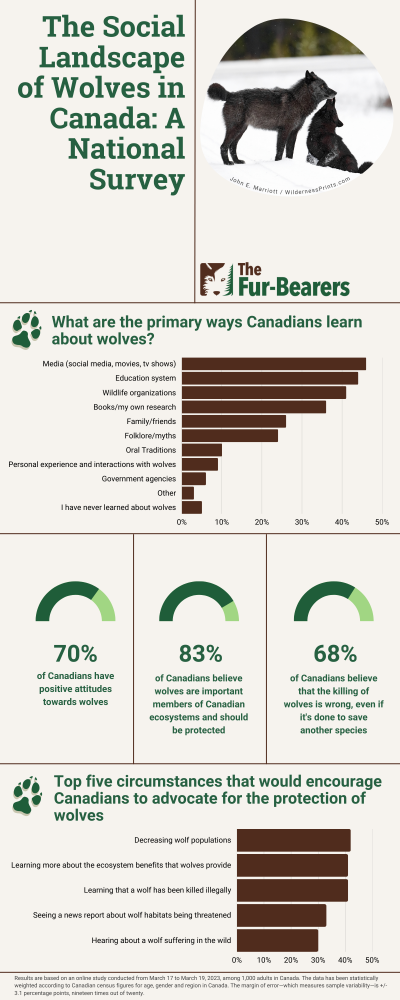
An iconic Canadian species, wolves play an important role in the country’s ecosystems. But what do Canadians know about wolves, how do they feel about these animals, and what would motivate people to protect wolves?
The Fur-Bearers has collaborated with researchers Stephanie Rutherford, PhD (Associate Professor, Trent University) and Valli Fraser-Celin, PhD (Independent Researcher), to understand Canadians’ perceptions and attitudes towards wolves. We would like to acknowledge their contributions to this project and expanding our collective knowledge about wolves in Canada.
Wolves in Canada
The International Wolf Center estimates that there are approximately 60,000 wolves found across Canada with the exception of NB, NS, and PEI. Because they are not considered a ‘threatened’ species, there is no protection for wolves outside of provincial and national parks. In some provinces, wolves have been subject to lethal control measures initiated by governments in an effort to stabilize declining caribou populations. In British Columbia for example, as of 2023, the province’s caribou recovery program has killed more than 1900 wolves since 2015.
Surveying Canadians about Wolves
To date, there has been very little research into Canadians’ attitudes and knowledge about wolves. Determining gaps in knowledge and discrepancies in attitudes toward wolves can provide insights into where and for whom coexisting with wolves is a challenge.

In March 2023, we developed an 11-question survey that was administered by Research Co. and completed by 1000 participants. We asked Canadians about their attitudes toward wolves, their knowledge of wolves, and what circumstances might prompt them to act for their protection.
Survey Results
Across Canada, 70% of survey participants have positive attitudes toward wolves; most survey participants considered wolves to be an iconic species and thought of them as important ecosystem members. Canadians learn about wolves primarily through media (including socials), the education system, wildlife organizations, and their own research rather than direct experiences.
In terms of demographics, younger people (18-55) and rural/remote populations have more positive attitudes toward wolves; additionally, rural/remote dwellers are also more likely to see/hear a wolf near their home and are more willing to accept having wolves live within 5 kms of their home. Finally, the Agriculture/Forestry/Hunting/Fishing industry has the most overall positive attitude compared to the Health/Leisure/Hospitality industry which has the most overall negative attitudes.
Canadians responded that the following circumstances would encourage them to act to protect wolves: decreasing wolf populations; learning more about the ecosystem benefits that wolves provide; learning that a wolf has been killed illegally; and seeing a news report about wolf habitats being threatened.
Livestock Depredation
A key lesson from this survey is that most Canadians believe that wolves are a primary threat to farmed animals, regardless of their attitudes toward wolves. While we do know that wolves predate on farmed animals in Canada, we don’t know exactly how much. In the United States, the Department of Agriculture states that 0.009% of the total cattle population were killed by wolves compared to 3.2% of cattle that died from ill health or weather; these numbers indicate that wolves most likely predate on fewer farmed animals than people think.
Wolf Management
Most Canadians believe that government conservation agencies are best positioned to manage wolves. However, a majority of survey participants agreed that wolves shouldn’t be killed, even if this management practice is designed to benefit another species (e.g. caribou).
Click the link below to download the factum with the survey results.

